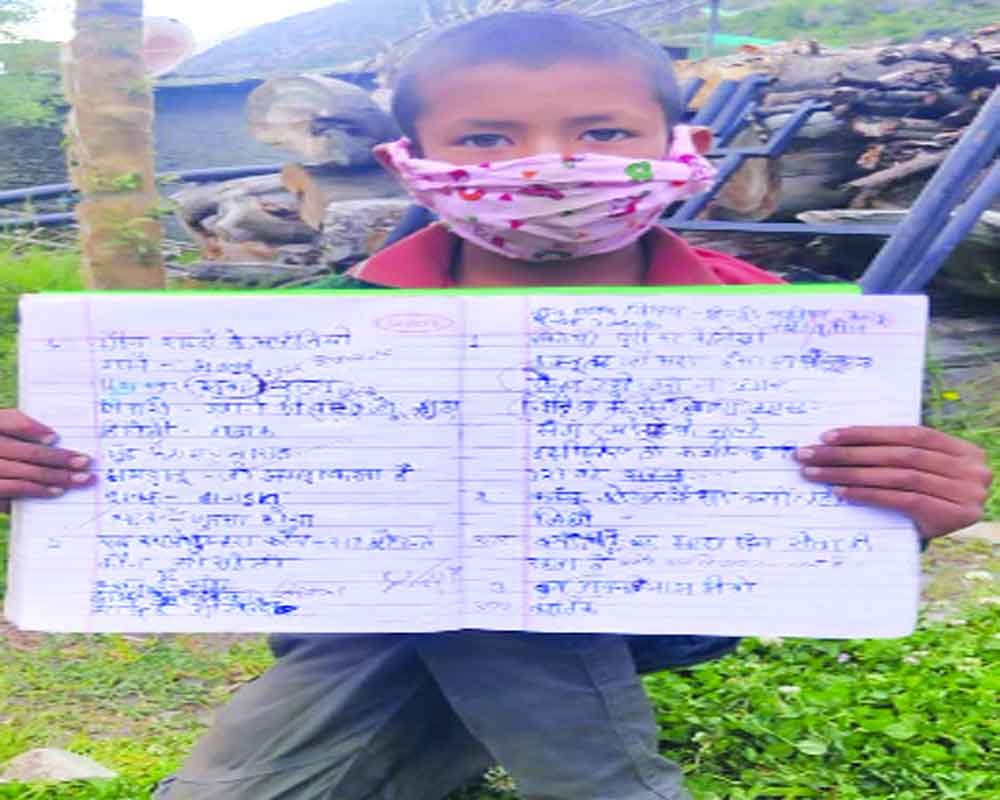The programme Har Ghar Pathshala requires teachers to be more innovative and engaging in their approach to educate their students remotely as the module faces several on-ground infrastructural challenges, says Sarita Brara
As all education institutes had to be shut in the wake of Coronavirus, a programme Har Ghar Pathshala was recently launched by the Himachal Pradesh Government. For the last few months, the programme is being implemented by holding digital classes, forming WhatsApp groups of students and teachers to provide hassle-free education to children. E-content has been prepared and students receive it in the form of assignments on the groups. The plan, unfortunately, is facing several on-ground infrastructural challenges.
There are remote villages and hamlets in this hilly state that are nestled in the mighty mountain ranges with limited infrastructural accessibility. One such region is the snowbound district of Lahaul and Spiti. Located approximately 400 km from the state capital Shimla, the entire region lacks basic facilities. Roads, healthcare, education, employment and electricity are the major development challenges faced by the local population here. The state of telecommunication is also quite weak. In such a situation, where there is either no or poor internet facility and the majority of the students do not have access to smartphones, the strategy to reach out to each and every student in the valley was revised. Instead of relying only upon the internet facility, the assignments and e-content of different subjects are now being delivered at their doorsteps.
The primary government school in the Jholing village has just four students — three girls and a boy. Surender Paul, one of the two teachers employed here, says that he himself goes to the students’ homes to deliver the assignments. Every Monday and Saturday, he walks a few kilometres to deliver or receive back the assignments.
Schools have been closed for more than four months now due to COVID-19. With no classroom sessions and no ‘one-to-one interaction’ with the students, teaching and learning can indeed become quite dull for both students as well as the teachers. With time on hand, teachers are experimenting in creative ways to break this monotony. To get his students hooked on their studies, Dev Jaspa, a school teacher from the government primary school in Jasrath village in Keylong in Lahaul and Spiti, has composed music for poems for Class III and has shared it in form of audio with his students. Dev believes that the challenge in this unprecedented situation is to devise creative ways to ensure that students do not lose interest in studies. He also keeps them engaged and busy through other creative activities like doodling and painting. He also keeps sending videos that can be both informative and entertaining for the students. There are two students each in Class I and Class III whom he teaches. The school, altogether, has eight students. “As there are a handful of students, we know each one of them personally and are well aware of their aptitude and interests. We have the advantage of preparing content in a way that suits each one of them,” shares Dev.
Aarti, a Class III student, says that she enjoys listening to the poems and watching educational videos shared by her teacher. Her mother Hirdai, an Asha worker, says that the students get assignments on their doorstep every week. On completion of these assignments, a screenshot of the same is sent to the teacher on WhatsApp. As per the teachers, the only problem they constantly face is the low internet speed and an erratic network, which is down for a minimum of four to five hours every day. “As the village is categorised under the Green Zone and there are only four students (two each in Class VI and Class VII) in the school, I have taken the permission of the parents to allow me to conduct in-person classes once a week. These four students come to an open area, wearing their masks and maintaining proper physical distance. This way, I am able to answer their queries in person,” explains Prem Singh, teacher in-charge of the government middle school who faces serious network issues while conducting online classes.
The situation is no different in the Spiti block. In Khar Village, which is inhabited by just 28 families, there are 12 students enrolled in the primary school. As per the school teacher, Chhewang Urgial, they face the dual challenges of internet connectivity and power supply. Since the parents of the students are mostly uneducated, expecting them to help their children in their studies would be unfair.
Hence, the Har Ghar Pathshala programme also requires parents to bear more responsibility for the education of their children, while teachers require to be more innovative and engaging in their approach. In the absence of any other alternative, the online system at least ensures that the learning process of the students continues. Despite the closure of the schools, its impact on the students is minimal. At the same time, it is important to take into consideration the social, economic and physical location of both the students and the teachers before conceptualising such an approach.
—Charkha Features
























